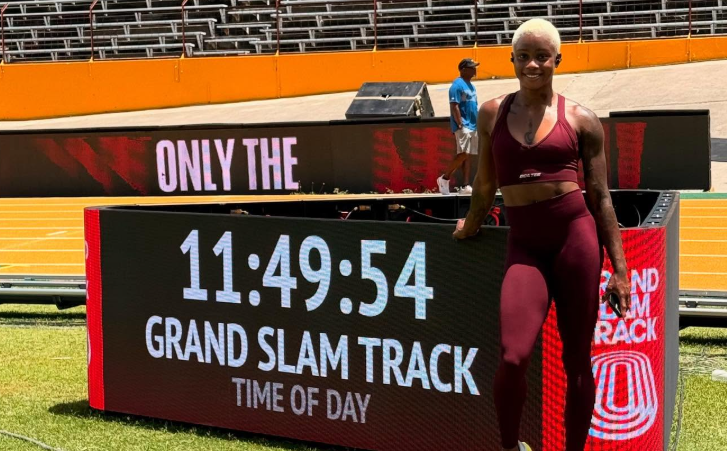

Salwa Eid Naser has been making waves in track and field. The sprinter shocked the world in 2019 when she won the 400m World Championship in just 48.14 seconds—the third-fastest time ever and the quickest in nearly 40 years. Before that, she had already grabbed a silver at the 2017 World Championships and later added an Olympic relay bronze in 2024.
Watch What’s Trending Now!
Yet she has not had an easy journey. In 2016, a long-dormant old ankle injury picked up from childhood when she got hit by a car, forcing her to withdraw from the Rio Olympic semi-finals. And it didn’t stop there. She had to sit through a two-year ban from 2021 to 2023 for missing drug tests. She called the decision “unfair” and promised to bounce back. And she did.
Salwa Eid Naser made her debut at Michael Johnson’s Grand Slam Track in the first phase at Kingston, and again performed at Miami as well. She pushed hard in the 400m, finishing just behind Paulino with a time of 49.33 seconds at Miami. But before we moved ahead, there might be curiosity about Salwa Eid Naser’s roots, her nationality, and her ethnicity. So, let’s dive deep into it.
ADVERTISEMENT
What is Salwa Eid Naser’s ethnicity and nationality? All to know about her Nigerian background
Salwa Eid Naser may now be a celebrated sprinter for Bahrain, but her roots trace back to Nigeria. She was born on May 23, 1998, in Onitsha, Anambra State, to a Nigerian mother and Bahrain-born father. Her ethnicity is Nigerian Igbo, one of the major ethnic groups in southeastern Nigeria.
Growing up in Nigeria, Salwa was introduced to athletics at a young age, showing promise early on. However, limited support and difficult conditions in the Nigerian sports system led her and her family to consider other options. At the age of 14, she made the life-changing decision to move to Bahrain for better training facilities and athletic opportunities.
ADVERTISEMENT

ADVERTISEMENT
Once she immigrated to Bahrain, she adopted Islam and remained attached to her Nigerian heritage—a path of difficult decisions and merged identities. So, what was the story about her name change? Let’s go back.
ADVERTISEMENT
What is the story behind her name change? Know the answer
Salwa Eid Naser wasn’t always known by this name, but was born as Ebelechukwu Antoinette Agbapuonwu in Onitsha, Nigeria. So, what led to the transformation? The turning point came when she moved to Bahrain at the age of 14 in search of better opportunities in athletics. As her father, Ogunjiofor Agbapuluonwu, put it, “She was gradually recovering when the offer from Bahrain came. And I had no choice but to let her go. There was no way I could have stood in her way.” The move was more than just a change in geography—it marked a personal and cultural shift as well, as she faced significant trouble, such as sleeping on the floor. After settling in Bahrain, she converted to Islam, and with that came a new identity: Salwa Eid Naser.
Top Stories
Drake Maye Reveals Shoulder Injury Update as Patriots QB Announces News On Super Bowl Availability

PGA Tour Split Into Two as Scottie Scheffler Confirms Stance on Patrick Reed’s Return

NFL Sends Muted Warning to Bad Bunny Before Super Bowl Halftime Performance Amid ICE Controversy

Travis Kelce Makes Sporting Return as Teammate Gives Update on Chiefs TE’s Retirement

Tempers Boil Over as Punches Fly in Winthrop vs High Point WBB Game

“Complete Bullsh*t”: Cup Stars Run Out of Patience Mid-Race as NASCAR Clash Turns Into Demolition Derby

The name change was a new beginning. It wasn’t about forgetting, but about moving into a place where she could become, both professionally and personally. Ever since, Salwa Eid Naser has stood tall, proudly representing Bahrain internationally, with both her Nigerian heritage and Bahraini nationality firmly in tow.
ADVERTISEMENT
ADVERTISEMENT
ADVERTISEMENT